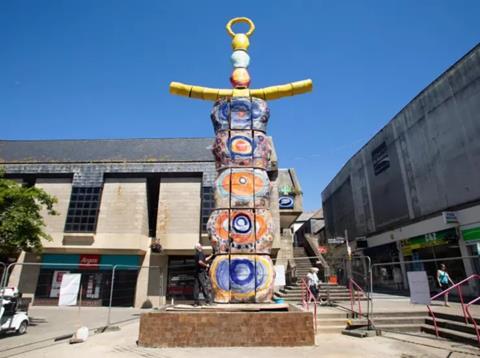When a pagan statue was unveiled in their town, six church leaders felt they had to make the spiritual implications clear to those around them, even if their arguments were misunderstood

This summer, a statue called the ‘earth goddess’ was installed in our town centre.
There was much local controversy over the decision here in St Austell, Cornwall. Some objected to the cost (£80,000), others to its positioning (a war memorial once stood there) and others to the appearance of the structure and the lack of consultation carried out by the council.
As church leaders from across all denominations, we had a choice to make. How do we respond? Is this really anything to do with us at all?
Speaking out
In the end, myself and six other church leaders felt compelled to write to the council and express our concern at the spiritual significance of the statue.
When it was unveiled, the artist said that the earth goddess represented: “our collective and eternal roots with the environment, nature, and mother earth.” She went on to talk about how it is topped with chakras (a Hindu concept relating to energy in the body). These are statements of spiritual significance that are incompatible with not only the Christian faith but many other beliefs held by people in our town.
It is important that we make our leaders aware of the spiritual implications of their decisions
We live in a pluralistic society that brings many different faiths together. Freedom of religion, respect for one another and the ability to disagree well are all so important. But in order to ensure that we truly have freedom of religion, that means that no faith or set of beliefs can be imposed upon another. There is a place for different faiths and beliefs to be represented and for events through which they can be explored, but a permanent feature that is installed in a public place must be something that is reflective of the whole community and which the whole community can celebrate.
Taking responsibility
We believe that it is our responsibility as Christian leaders, within the spheres that we have been appointed, to speak out about the spiritual implications of what we do as a society. This is the role of the prophet. In the Old Testament prophets spoke out - often at great personal cost - against injustice and idolatry. As churches, we work hard for the good of St Austell in practical ways and regularly pray together for the local councillors and businesses. We desire to see our town blessed by God. And so when a statue is installed that is incompatible with the Christian faith, we had to voice our concerns.
We’ve made it clear that we do not expect our views to be accepted by everyone - or even fully understood. But we felt the need to make our leaders aware of the spiritual implications of their decisions.
A permanent feature installed in a public place must be something that the whole community can celebrate
What has been the response? Many of the councillors and leaders we wrote to have engaged respectfully with us, but since the story has been picked up by the media there has been a sense of outrage that we would dare to speak out and express our faith. I’ve been asked what right I have to do so more than once.
There is a sense that, by expressing our faith in a creator God and how a statue representing our eternal roots in mother earth is offensive, that we are somehow imposing our beliefs on others. This is not true. The reality is that we are standing together to protect our town as a place where our Christian faith is respected.


































2 Readers' comments